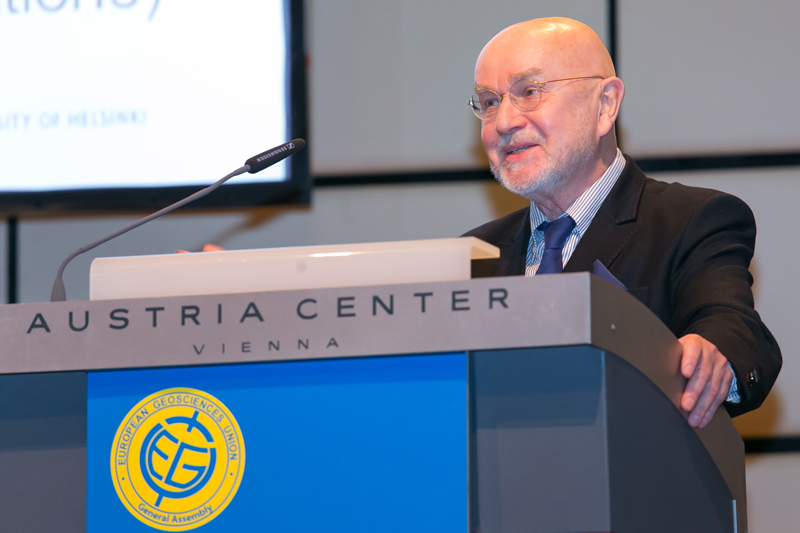Obituary for Sergej Zilitinkevich
Professor Sergej S. Zilitinkevich, our long-standing convener of the Boundary Layer Session at EMS, passed away on Monday, February 15, 2021.
We will remember him for his deep knowledge of boundary layer meteorology, the energy and passion he displayed in all aspects of his work and last not least his unique personality. He was always developing new ideas even in his 80s. Indeed, for over 50 year Sergej carried out pioneering work in the physics of atmospheric turbulence and planetary boundary layers. This advanced knowledge of the Earth system and supported the development of weather and air quality predictions and climate modelling. His entire life has been devoted to science.
Sergej Sergeevich Zilitinkevich was born on 13 April 1936 in Leningrad. In 1962, he defended his dissertation for the Candidate of Sciences (equivalent to PhD) in physics and mathematics and was already leading the Air Pollution Laboratory of the Voeikov Main Geophysical Observatory in Leningrad by 1964. Two years later, he founded the Leningrad Branch (on turbulence, boundary layers and air-sea interaction) of the Moscow Institute of Oceanology, USSR Academy of Sciences. In 1968, he defended his dissertation for Doctor of Sciences in physics and mathematics. This was followed by him being awarded the academic title of Professor of Geophysics by the Presidium of the USSR Academy of Sciences in 1972. During these years, while working in the USSR, Sergej published over 100 scientific peer-reviewed articles and 6 books on planetary boundary layers, air-sea interaction, environmental turbulence, general circulation of planetary atmospheres, theory of climate, and physical aspects of aquatic ecosystem modelling.
From 1990 onwards, his scientific career continued in other European countries. First in Denmark, as a Visiting Professor at the Wind Energy Department, Risø National Laboratory. Then, during 1991-1997, in Germany as a Visiting Professor at the Max-Planck Institute for Meteorology in Hamburg, the Alfred Wegener Institute for Polar and Marine Research, and the Institute of Hydrophysics (now Institute for Coastal Research) in Geesthacht. In 1998-2003, he became the Professor and Head of the Department of Meteorology at Uppsala University in Sweden.
In 2004, he moved to Finland with an EU-funded EU-Marie Curie Chair of Boundary-Layer Physics at the University of Helsinki, and then in 2008 he became a Research Professor at the Finnish Meteorological Institute with a European Research Council Advanced Research Grant to work on his new ideas for revisiting boundary layer theories to account for non-local effects and potential energy. Later he continued as Research Director at the Institute for Atmospheric and Earth System Research of the University of Helsinki. He was a founding member of the multi-year international Pan-Eurasian Experiment (PEEX) Programme, which unites scientists from Europe, Russia and China in pursuit of solutions to Grand Challenges, including climate change and environmental pollution.
Sergej will be remembered as a positive person, always looking forward, eager to find new discoveries out of complicated equations. This has to be put in perspective of his sometimes harsh early life: enduring the siege and hunger in Leningrad (1941-44), life in a labour camp following a fabricated conviction, or restrictions on scientific cooperation. He however never gave up and found new research topics for activating his brain and motivating young colleagues.
At EMS Annual Meetings, many of us have enjoyed Sergej’s keynote lectures, where we witnessed his excitement at developing new ideas and his passion for trying to find coherence in geophysical turbulence.
Sergej is an Honorary Member of the European Geophysical Union, a member of the International Eurasian Academy of Sciences, of the Academia Europaea, of the Finnish Academy of Science and Letters, and a fellow of the Royal Meteorological Society. He was awarded the Vilhelm Bjerknes Medal of the European Geophysical Society (in 2000), the Alfred Wegener Medal of the European Geophysical Union (in 2015), and the most prestigious award in hydrometeorology, the International Meteorological Organization Prize (in 2019) for outstanding contributions to meteorology, climatology and research in related fields.
Sylvain Joffre, Chair of the EMS Committee on Meetings
Heinke Schlünzen, EMS Treasurer



Kommentare sind geschlossen.